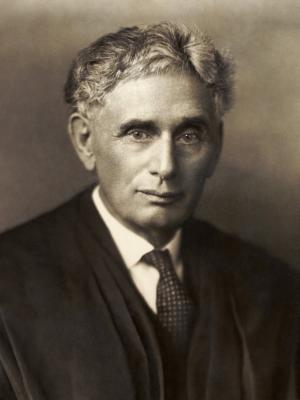
This famous quote from Louis D. Brandeis is window to the man who dedicated his life to public service, first as an attorney fighting for the rights of the common man, and later as a U.S. Supreme Court Justice protecting the laws of the land.
Born in Louisville, Kentucky in 1856, Brandeis excelled in school and enrolled in Harvard Law School at the age of 19 without any prior formal education. He graduated two years later as class valedictorian.
After graduating from law school, he became a successful attorney in Boston and worked to reduce government corruption, protect the socially and economically disadvantaged, and advocate for individual freedoms. He became known as the people's attorney because he was one of the first lawyers to work pro bono for his clients. Brandeis married Alice Goldmark in 1891 and had two daughters and four grandchildren.
Brandeis earned a national reputation for his decade-long effort to stop a merger of New England railroad companies. He feared a monopoly would impact consumers and waged a successful legal battle against the merger from 1905 to 1914.
He again earned national prominence for his role in Muller v. Oregon, which challenged a state law that limited a woman's work day to 10 hours. As part of his defense for the state of Oregon, Brandeis boldly submitted a brief that contained an analysis of hundreds of sources of factual data about the impact of long working hours on women. It was the first time that social science was applied to law, and what would become known as the Brandeis Brief became the model for building legal cases.
Though Brandeis was not raised in a religious household, he developed a connection to his Jewish heritage as he became more aware of the needs of the Jewish community through his work as an attorney. He embraced Zionism, a movement that at the time called for the creation of a Jewish homeland in Palestine, and he became a leader of the American Zionist movement in 1914.
President Woodrow Wilson nominated Brandeis to the Supreme Court in 1916. Not everyone subscribed to Brandeis' progressive ideals, and his confirmation hearings were among the most debated in American history. When his nomination finally was approved, he became the first Jewish person to serve on the Supreme Court.
Of the 528 opinions Brandeis wrote while on the high court, 454 were for the majority. However, Brandeis probably is best known for his dissent in Olmstead v. United States and his concurrence in Whitney v. California. In Olmstead, Brandeis argued for an individual's right to privacy, and in Whitney, he eloquently defended the freedom of speech.
Brandeis retired from the Supreme Court in 1939 and died in 1941 in Washington, D.C.
Brandeis believed that education happened both inside and outside the classroom, and the mark he left on the social conscience of this country will continue to inspire the students of Brandeis High School for years to come.
Sources: Louis D. Brandeis: Justice for the People, Brandeis University, michaelariens.com, Notable Biographies
